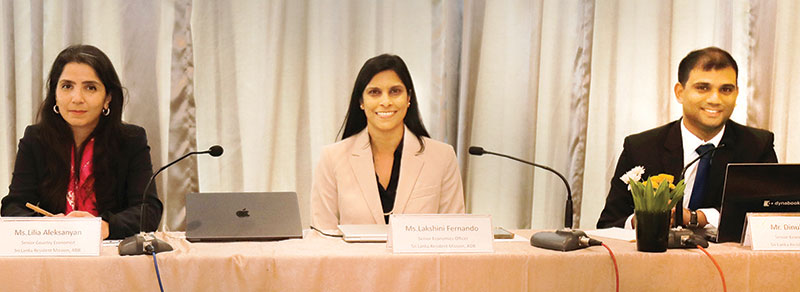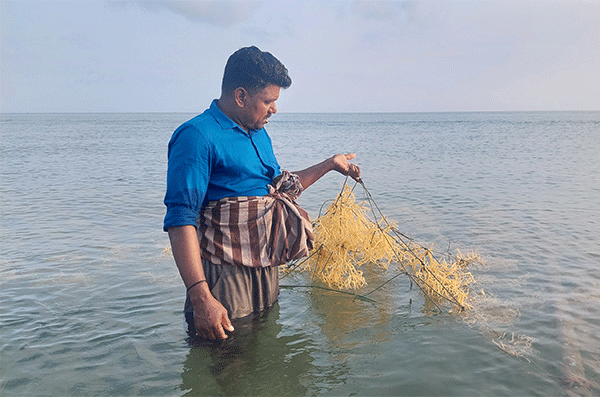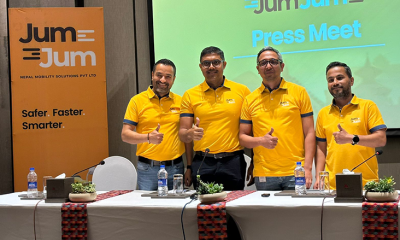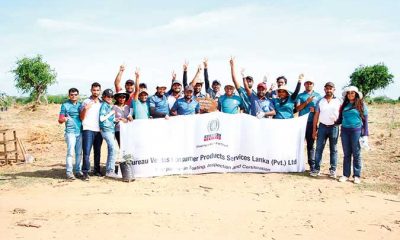Business
Defending Mangroves and Afforesting Underwater

Having had a keen interest in marine conservation since the inception of its environmental arm, Dilmah Tea is strengthening its investments in blue carbon – particularly mangrove conservation and sustainable seaweed harvesting in keeping in line with the UN decade of (ecosystem) restoration in 25 acres of land in Kappaladi Kite Lagoon in Kalpitiya, a company news release said.
Dilmah Conservation (DC), the sustainability arm of the tea company, is restoring mangroves. Currently a nursery with over 800 mangroves saplings consisting of seven species has been established and once at a ready height the saplings are planted in the degraded mangrove forest area. Meanwhile in Mannar, around 10 acres of land are being used for seaweed cultivation through sustainable methods, the release said.
Investing in blue carbon by restoring such ecosystems can contribute towards climate resilience as mangroves and Seaweed are better at storing carbon that terrestrial forests. Mangroves can absorb up to five times more carbon than forest trees. Similarly, seaweed generates more oxygen that land plants and absorbs more carbon too, it explained.
“A standout feature of Dilmah Conservation has been its collaborations and partnerships with different stakeholders and establishing the project on a strong scientific foundation. The organization partly attributes public-private partnerships for the long-term success of its marine conservation-related projects and therefore collaborates with the Marine Environmental Protection Authority (MEPA) and National Aquaculture Development Association (NAQDA) and maintains dialogues with universities and independent organizations such as Pearl Protectors,” the release said.
“Under the Defending Mangroves project, a baseline survey in collaboration with MEPA helped identify types of mangroves existing in the area, suitable locations for restoration, and ideal mangrove species suited to the area. Hands-on experiential learning sessions with schools in the area have also been instrumental in generating awareness about the importance of these ecosystems.
“For maintaining a nursery Dilmah has employed community members. The value of mangrove ecosystems stands in stark contrast to the dearth of available research. Therefore, Dilmah will establish a research station to strengthen the success of the project and make it replicable in other parts of the island as well.”
Under the sustainable seaweed cultivation project: Afforesting Underwater, DC has sought technical expertise and works closely with the National Aquaculture Development Association (NAQDA) to develop community fishermen into sustainable seaweed farmers. So far, around 10 acres have been cultivated in Pesalai, and plans to expand to other parts of the coastline are underway, the release further said.
“As conservation and culture overlap Dilmah takes into consideration sustainable livelihood upliftment in its projects. Thereby, in a collaborative effort seaweed agripreneurs were empowered through an incubator program known as the Lost Ingredients Lab.
“Education and awareness are one of the important pillars for Dilmah Conservation, thus the organization has consecutively sponsored the Pearl Protectors’ World Ocean Summit – a landmark event spearheaded by the independent marine conservation organization. In 2021 this was the largest virtual summit in Sri Lanka. This year the event was held at One Galle Face Mall to the enthusiasm of the public.”
Muditha Katuwawala, Founder of Pearl Protectors said, “We are absolutely delighted to have Dilmah Conservation onboard towards celebrating World Oceans Day for the second year. The Pearl Protectors have been consecutively celebrating world oceans day through knowledge sharing, art competitions, and inspiring the generation of Ocean enthusiasts. We hope our collaborative efforts will continue to positively impact the marine environment in Sri Lanka”
Driven by Dilmah Tea founder’s vision of creating a better tea for people and the planet, the tea company has constantly initiated projects to impact terrestrial ecosystems. Marine ecosystems are also close to Dilmah’s heart. In the past initiatives such as enabling the gazetting of an important reef called Kayernkerni in Kalkudah as a marine sanctuary, education, and awareness creation about Dugons in a fishing community, and keeping 50 km of the coastlines free by employing 50 caretakers, the release concluded.
Business
ADB urges SL to accelerate recovery with fiscal discipline and global trade shifts

Recommends prudent policy choices and regional collaboration
The Asian Development Bank (ADB) has highlighted Sri Lanka’s economic recovery as exceeding initial expectations in its Asian Development Outlook April 2025 report, but cautioned that the rebound remains fragile, with significant risks posed by global trade tensions, fiscal pressures, and unresolved debt vulnerabilities.
The following are some key highlights from the report:
Sri Lanka’s economy is projected to grow at a moderate pace in 2025–2026, driven by broad-based improvements. However, domestic demand is expected to stay sluggish, reflecting lingering challenges from the country’s recent economic crisis. While fiscal consolidation efforts remain on track bolstered by stronger-than-anticipated revenue. With that said, however, the ADB warned that under-execution of capital spending or a loss of reform momentum could derail progress.

Takafumi Kadono, ADB Country Director for Sri Lanka, brings profound expertise in both macro and microeconomic dynamics, steering transformative development support tailored to Sri Lanka’s evolving needs
After a period of deflation, Sri Lanka’s inflation is forecast to rise in 2025 due to higher electricity tariffs, relaxed import restrictions, wage hikes, and exchange rate depreciation. The government’s commitment to fiscal discipline faces pressure from potential expenditure increases, even as external debt interest payments resume, pushing the current account into deficit.
The ADB’s analysis of new US tariffs, identifies Sri Lanka as vulnerable to trade disruptions. Key risks include:
Sri Lankan exporters, particularly in sectors with thin profit margins, face order cancellations and profit losses.
Competitors like India, Malaysia, and Mexico—benefiting from lower US tariffs—could attract investment away from Sri Lanka.
Full implementation of tariffs could slash GDP growth by depressing exports, manufacturing, and investor confidence, while raising unemployment and fiscal strains.
To mitigate risks, the ADB urges Sri Lanka to diversify export markets and products. Opportunities include expanding into niche EU markets and Asian regional partners, as well as boosting high-value sectors like electronics. Strengthening regional cooperation and accelerating structural reforms could enhance resilience.
Despite progress under its IMF program, Sri Lanka’s debt burden remains “high,” requiring sustained reforms to stabilise public finances. The ADB emphasised that fiscal reversals or delays in restructuring could undermine macroeconomic stability.
While South Asia remains the fastest growing subregion fueled by India’s robust domestic demand, Sri Lanka’s trajectory is distinct, marked by post-crisis recovery challenges. Developing Asia’s overall growth is moderating due to US-China trade tensions and China’s property sector woes, further complicating Sri Lanka’s external environment.
“Sri Lanka’s recovery is commendable but incomplete,” the report states. “Accelerating reforms, safeguarding fiscal discipline, and diversifying trade partnerships are critical to navigating global headwinds and ensuring long-term stability.”
As Sri Lanka balances optimism with fragility, the ADB’s outlook underscores the urgency of maintaining reform momentum while preparing for escalating external risks. The path to sustained recovery, concludes, hinges on prudent policy choices and regional collaboration.
By Sanath Nanayakkare
Business
HOPPR Unveiled: PayMaster’s latest innovation that transforms ride-hailing and digital credit access

PayMaster, the leading, award-winning digital payments app in Sri Lanka, has announced its launch of HOPPR, a cutting-edge ride-hailing feature that will transform the market by providing all stakeholders from drivers and customers with financial independence through digital payments and credit access. More than just a ride-hailing service, HOPPR is a tool for financial empowerment that works in unison with PayMaster to allow users to schedule rides without using cash and to open up long-term revenue streams.
A sustainable revenue strategy is established by its unique referral system, which allows drivers to receive lifetime earnings for each user referred, emphasizing that both passengers and drivers are not just participants but valued stakeholders of the platform. Additionally, CREDDY, an AI-powered credit system that acknowledges informal income streams, is connected with HOPPR where drivers can obtain revolving credit of up to Rs.50,000 at 0% interest through CREDDY for everyday expenses, fuel, and vehicle repairs, assisting in closing gaps in their finances and fostering financial stability.
Ransika De Silva, Director/CEO of PayMaster, stated, “With HOPPR, we have built a driver-centric system where each ride is an opportunity to earn, save, and grow financially rather than just a journey. We are changing the financial landscape for gig workers and informal earners, starting with ride-hailing, digital payments, credit access and future expansion into areas for informal income.”
PayMaster is a one-stop app for payments that makes transactions in Sri Lanka easy. From local money transfers, receiving money from around the globe to a local account within two seconds, paying bills, and topping up mobile accounts, users can now also use ride-hailing services thanks to HOPPR. PayMaster, a fully owned subsidiary of Singapore-based FinTech FirstPay (Pte) Ltd, guarantees the highest international security standards by following the criteria for mobile apps from the Central Bank of Sri Lanka (CBSL) and submitting to frequent security assessments conducted by a globally reputed auditing firm.
Business
CSE launches in bullish vein, energized by US President’s ‘90-day pause’

The CSE opened yesterday in a bullish manner after US President Donald Trump announced a 90-day pause on enforcing increased tariffs on exports.
President Trump said he is ordering a pause on ‘reciprocal’ tariffs slammed on Sri Lanka and other countries after 75 countries offered to negotiate, amid a collapse of stock markets, but a 10 percent tax would remain. Many stock markets around the world were back in the green.
The All Share Price Index was trading up on 693 points within the first half hour of opening and the more liquid S&P SL20 was up 6.42%, or 286 points, at 4,632.00.
Turnover was Rs 6.1 billion with ten crossings. Those crossings were reported in JKH which crossed 30.7 million shares to the tune of Rs 607 million and its shares traded at Rs 20.10, Sampath Bank 3.7 million shares crossed for Rs 419 million; its shares traded at Rs 150, Commercial Bank 2.2 million shares crossed for Rs 151 million; its shares traded at Rs 125.
Singer (Sri Lanka) 1.5 million shares crossed for Rs 52.5 million; its shares traded at Rs 35, Vidul Lanka 3.7 million shares crossed for Rs 49.4 million; its shares traded at Rs 13.50, People’ Leasing 2 million shares crossed to the tune of Rs 35 million; its shares sold at Rs 2.70, HNB 100,000 shares crossed to the tune of Rs 30.5 million, Hemas Holdings 210,000 shares crossed for Rs 23.4 million; its shares traded at Rs 117, LMF 500,000 shares crossed to the tune of Rs 21.4 million; its shares fetched Rs 42.70 and DFCC 200,000 shares crossed to the tune of Rs 20 million; its shares traded at Rs 100.
In the retail market top six companies that have mainly contributed to the turnover were; Sampath Bank Rs 709 million (6.2 million shares traded), Commercial Bank Rs 626 million (4.4 million shares traded), HNB Rs 619 million (two million shares traded), JKH Rs 346 million (three million shares traded), RIL Properties Rs 164 million (10.3 million shares traded) and Brown’s Investments Rs 161 million (22.1 million shares traded).During the day 212 million shares volumes changed hands in 23287 transactions.
Yesterday, US dollar buying rate was Rs 297.50, while the selling rate was Rs 298.60.
By Hiran H Senewiratne
-

 Business5 days ago
Business5 days agoColombo Coffee wins coveted management awards
-

 Business7 days ago
Business7 days agoDaraz Sri Lanka ushers in the New Year with 4.4 Avurudu Wasi Pro Max – Sri Lanka’s biggest online Avurudu sale
-

 Features6 days ago
Features6 days agoStarlink in the Global South
-

 Business7 days ago
Business7 days agoNew SL Sovereign Bonds win foreign investor confidence
-

 Features3 days ago
Features3 days agoSri Lanka’s Foreign Policy amid Geopolitical Transformations: 1990-2024 – Part III
-

 Features6 days ago
Features6 days agoModi’s Sri Lanka Sojourn
-

 Midweek Review3 days ago
Midweek Review3 days agoInequality is killing the Middle Class
-

 Features5 days ago
Features5 days agoSri Lanka’s Foreign Policy amid Geopolitical Transformations: 1990-2024 – Part I


















